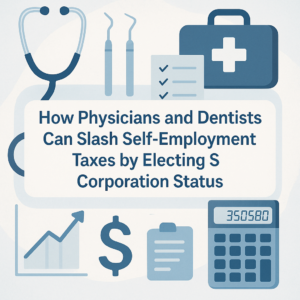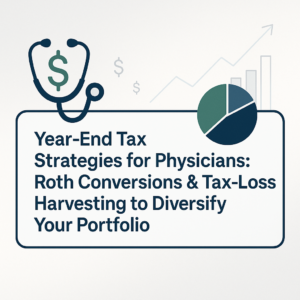Estate planning is a crucial, yet often overlooked, part of financial planning for healthcare professionals. While you’re busy caring for others, it’s important not to neglect your own family’s financial well-being. Recent changes in IRS rules governing trusts could have significant implications for your estate plan, potentially exposing your heirs to unexpected capital gains taxes. In this comprehensive guide, we delve into the nuances of these new IRS rules and their impact on irrevocable trusts, offering actionable advice tailored to young healthcare professionals.
What is an Irrevocable Trust?
Irrevocable trusts have been a cornerstone of estate planning for decades. They were initially tools for wealthy families to manage and protect their assets. Over time, their benefits became more broadly recognized, prompting even middle-class individuals to use them for specific financial and legal advantages. Historically, IRS rules have allowed irrevocable trusts to avoid massive tax burdens, with the step-up in basis being a key feature.
An irrevocable trust is a fiduciary arrangement that allows a person, known as the grantor, to transfer assets into a trust managed by a trustee for the benefit of the beneficiaries. Unlike a revocable trust, the grantor relinquishes control over the assets placed in an irrevocable trust. This means they cannot retrieve the assets or alter the terms of the trust.
Common Use Cases Among Healthcare Professionals:
Healthcare professionals, such as doctors, dentists, and pharmacists, often use irrevocable trusts for various reasons, including:
- Medical Malpractice Protection: By transferring assets to an irrevocable trust, healthcare professionals can protect their assets from potential malpractice claims. For example, a surgeon might place investment properties in an irrevocable trust to shield them from potential lawsuits.
- Minimizing Estate Taxes: Irrevocable trusts can effectively reduce the size of a taxable estate, potentially lowering estate tax liabilities.
- Medicaid Eligibility: Irrevocable trusts can help preserve assets for heirs while enabling the grantor to qualify for Medicaid benefits. A nurse nearing retirement, facing long-term care needs, might use this trust to manage her healthcare expenses without depleting her savings.
- Wealth Preservation and Distribution: These trusts ensure that assets are managed and distributed according to specific wishes, which is crucial for individuals with high-income careers.
Benefits of Using an Irrevocable Trust in Estate Planning:
- Tax Benefits: Irrevocable trusts can reduce estate taxes and shield assets from capital gains taxes.
- Asset Protection: They protect against creditors and lawsuits, providing peace of mind for healthcare professionals concerned about liability risks.
- Control Over Asset Distribution: These trusts specify how and when assets will be distributed, which is essential for ensuring that heirs receive their inheritance as intended.
New IRS Rules: A Game Changer
The IRS periodically updates its rules to close loopholes, enhance fairness, or adjust to new economic realities. The recent changes to the rules governing irrevocable trusts aim to ensure that tax liabilities reflect the current value of assets and to prevent individuals from circumventing estate taxes through strategic allocations. This move aims to capture tax revenues more effectively and ensure that the tax burden is distributed more evenly across different income brackets.
Under new IRS rules, assets inside irrevocable trusts may not receive a step-up in basis unless those assets are included in the taxable estate upon death. Previously, the assets held in many irrevocable trusts received a step-up in basis to the fair market value at the time of the grantor’s death, eliminating capital gains taxes on the appreciation during the grantor’s lifetime.
Differences Between Previous and Current Rules:
- Previous Rules: Assets within an irrevocable trust would typically receive a step-up in basis upon the grantor’s death, allowing heirs to sell the assets without incurring capital gains taxes on the appreciation.
- Current Rules: Assets in an irrevocable grantor trust will not receive a step-up in basis unless they are included in the taxable estate, meaning heirs could face significant capital gains taxes on the appreciation of the assets.
Step-Up in Basis Explained
The step-up in basis is a provision in the tax code that adjusts the value of an inherited asset to its fair market value at the time of the original owner’s death. This adjustment eliminates capital gains taxes on the appreciation that occurred during the original owner’s lifetime.
Heirs benefit from the step-up in basis because they can sell inherited assets without owing capital gains taxes on the appreciation that occurred while the assets were owned by the deceased. For example, if a parent bought a stock for $100,000 and its value increased to $500,000 by the time of their death, the heir can sell it for $500,000 without incurring taxes on the $400,000 gain.
The New Limitations Imposed by the IRS Changes:
Under the new IRS rules, assets held in some irrevocable trusts will not receive this step-up in basis unless those assets are included in the taxable estate. This means that if the original owner paid $100,000 for the stock, and it is worth $500,000 at their death, the heir would owe capital gains taxes on the $400,000 gain if the asset is not included in the taxable estate.
The Potential Financial Impact
Different tax brackets can influence the impact of the new IRS rules. While high-income professionals like surgeons and anesthesiologists might face steeper penalties due to larger estates, even mid-level healthcare professionals like physical therapists and pharmacists could see substantial impacts if their estates cross the reduced exemption thresholds. It’s vital to understand that the size and growth potential of one’s estate can significantly affect the overall tax liability.
Detailed Examples Across Asset Types:
- Real Estate: A physician who invested in rental properties and placed them in an irrevocable trust may find that the properties’ significant appreciation now incurs hefty capital gains taxes for heirs. For instance, an apartment complex bought for $500,000 and now worth $2 million would previously have been passed on tax-free but now faces a $1,500,000 capital gains tax at a 20% rate.
- Stocks: A pharmacist who invested in tech stocks within a trust might see a similar impact. If those stocks were bought for $200,000 and are now worth $1 million, the $800,000 appreciation would attract substantial capital gains taxes.
- Business Ownership: A dentist who placed ownership of their practice in a trust will encounter issues not just with asset appreciation but also potential valuation complexities that could compound tax implications.
Estate Tax Exemption: What’s Next?
As of 2024, the estate tax exemption amount is $13.61 million per person and $27.22 million for a married couple. However, these thresholds are set to expire at the end of 2025. Unless Congress extends the current limits, the exemption will revert to the 2017 levels, approximately half of today’s thresholds.
Potential Legislative Changes and Predictions:
Experts predict that estate tax exemptions are a likely target for lawmakers seeking to balance budget deficits. Some propose maintaining the higher thresholds, while others argue for reductions to the levels of previous decades. It remains important to stay informed about potential legislative changes that could affect these thresholds.
Specific Strategies in Minimizing Potential Tax Liabilities
- Gifting Strategies: Utilize the annual gift exclusion ($18,000 per recipient in 2024) and lifetime gift exclusion to reduce the taxable estate size. For example, gifting shares of stock or fractional interests in real estate to heirs can gradually transfer wealth while minimizing tax impact.
- Irrevocable Life Insurance Trusts (ILITs): Set up an ILIT to own life insurance policies. At death, the policy payouts cover estate taxes without adding to the estate’s value. This strategy ensures liquidity for estate expenses while preserving asset values for heirs.
- Charitable Donations: Reduce estate size through donations to qualified charities. Directing parts of the estate to philanthropic causes can lower taxable amounts while fulfilling personal values and social responsibility goals.
Estate planning is not just for the wealthy; it is an essential part of financial planning for everyone, including busy healthcare professionals. By staying informed about changes in tax laws and regularly reviewing your estate plan, you can ensure that your legacy is protected. Give your loved ones peace of mind by taking proactive steps today. A well-executed estate plan is a lasting gift to your heirs, ensuring that they are shielded from unnecessary tax burdens and that your financial wishes are honored.
General Disclaimer: This material is for informational purposes only and is not intended to provide specific legal, tax, or financial advice. Please consult a qualified professional before making any decisions.






